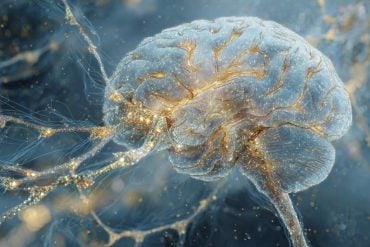Summary: Researchers report keeping levels of KYNA low throughout a worm’s life can help prevent the onsite of age-related cognitive decline.
Source: UCSF.
It’s a fact of life, for lifeforms big and small, that the mind declines with age. Now researchers at UC San Francisco have identified the buildup of one brain chemical as a key culprit behind age-related learning and memory impairments. Tuning levels of this chemical in the worm C. elegans, they could delay and even reverse the declines of old age.
For C. elegans, a tiny worm that lives only about two weeks, old age and its handicaps come fast – which makes them a convenient model for studying aging. A seven-day old worm has only five percent of the learning capacity of a one-day old worm.
“You look at a person, a fly, a mouse, and a worm. They all look very different from each other, of course. But the amazing thing is the basic building blocks turn out to be the same,” said Kaveh Ashrafi, PhD, a professor of physiology and member of the UCSF Weill Institute for Neurosciences, who led the new research.
In both C. elegans and humans, the chemical kynurenic acid (KYNA) accumulates with age. As it builds up, KYNA interferes with the activity of glutamate, a brain chemical essential for learning and memory. In humans, it has previously been linked to neurodegenerative disorders, including Alzheimer’s and Parkinson’s disease.
In the study published Jan. 31, 2018, in Genes and Development, researchers looked at the effect of KYNA on the worms’ ability to learn an association between a neutral smell and food.

The researchers found that by keeping KYNA levels low throughout the worm’s life, they could prevent the onset of age-related decline – the worms kept learning. In older worms already impaired, lowering KYNA levels could counteract the impairments – raising hope that interventions later in life may be effective in reversing neurological decline.
The reason that KYNA increases with age is still a mystery, but the new study offers an intriguing hint, by linking KYNA buildup in aging worms to elevated levels of insulin, a hormone that controls blood sugar in both worms and humans. In contrast, earlier experiments by Ashrafi’s team had found that fasting, which has been linked to longevity, reduced levels of KYNA in worms and improved learning and memory.
Ashrafi thinks that KYNA is the linchpin through which fasting makes the brain better at learning, while aging makes it worse. “These are two sides of the same coin,” he said.
Source: UCSF
Publisher: Organized by NeuroscienceNews.com.
Image Source: NeuroscienceNews.com image is credited to UCSF.
Original Research: Abstract in Genes and Development.
doi:10.1101/gad.307918.117
[cbtabs][cbtab title=”MLA”]UCSF “Brain Chemical Blamed For Old Age Mental Decline Could Hold Key to Its Reversal.” NeuroscienceNews. NeuroscienceNews, 6 February 2018.
<https://neurosciencenews.com/kyna-alzheimers-reversal-8435/>.[/cbtab][cbtab title=”APA”]UCSF (2018, February 6). Brain Chemical Blamed For Old Age Mental Decline Could Hold Key to Its Reversal. NeuroscienceNews. Retrieved February 6, 2018 from https://neurosciencenews.com/kyna-alzheimers-reversal-8435/[/cbtab][cbtab title=”Chicago”]UCSF “Brain Chemical Blamed For Old Age Mental Decline Could Hold Key to Its Reversal.” https://neurosciencenews.com/kyna-alzheimers-reversal-8435/ (accessed February 6, 2018).[/cbtab][/cbtabs]
Abstract
Kynurenic acid accumulation underlies learning and memory impairment associated with aging
A general feature of animal aging is decline in learning and memory. Here we show that in Caenorhabditis elegans, a significant portion of this decline is due to accumulation of kynurenic acid (KYNA), an endogenous antagonist of neural N-methyl-D-aspartate receptors (NMDARs). We show that activation of a specific pair of interneurons either through genetic means or by depletion of KYNA significantly improves learning capacity in aged animals even when the intervention is applied in aging animals. KYNA depletion also improves memory. We show that insulin signaling is one factor in KYNA accumulation.






